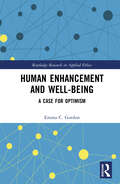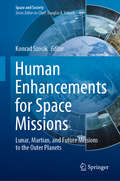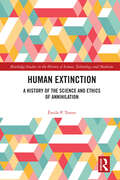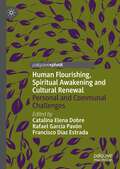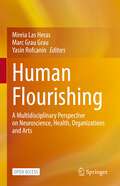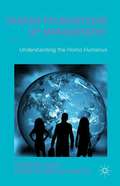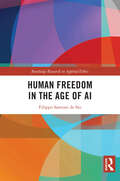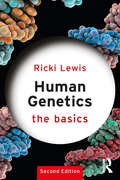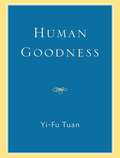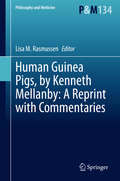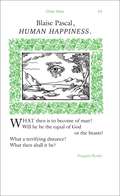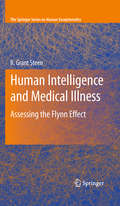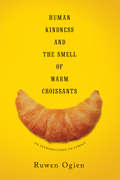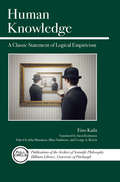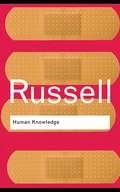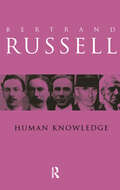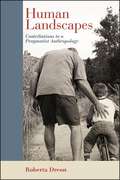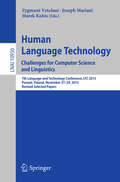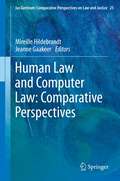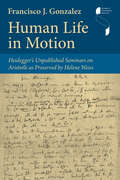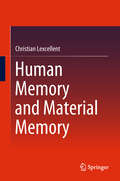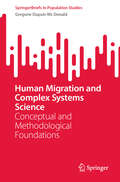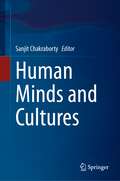- Table View
- List View
Human Enhancement and Well-Being: A Case for Optimism (Routledge Research in Applied Ethics)
by Emma C. GordonNew technologies and medicines make it increasingly possible to enhance human functioning in new ways: to become smarter, more emotionally attuned, and perhaps even morally better. But just because we can use the latest science to improve ourselves, should we? This book has two main aims. First, it outlines and criticises the six main contemporary arguments for scepticism about the role of human enhancements in promoting well-being. These arguments concern, respectively, (i) the value of achievements, (ii) freedom, (iii) hyperagency, (iv) human nature, (v) authenticity, and (vi) inequality. It will be shown – for the first time in a book-length treatment – why the overarching bioconservative case against enhancement doesn’t hold water. The second central aim of the book is positive; as we’ll see, each of the bioconservative critiques considered and rejected will be shown to nonetheless motivate a distinctive kind of theoretical desideratum that a viable positive enhancement proposal should satisfy. The remainder of the book then defends a two-part enhancement proposal that will be shown to clearly satisfy the theoretical desiderata that emerged from reflecting on the earlier critique of bioconservativism. The first part of the positive proposal motivates and outlines the general role of an enhancement counsellor in facilitating voluntary enhancement; I then offer an applied case study of this role in the special case of enhancement for the purpose of facilitating romantic and parental relationships. Human Enhancement and Well-Being: A Case for Optimism will be of interest to scholars and advanced students working in applied ethics, bioethics, philosophy of technology, philosophy of well-being, and social epistemology.
Human Enhancements for Space Missions: Lunar, Martian, and Future Missions to the Outer Planets (Space and Society)
by Konrad SzocikThis book presents a collection of chapters, which address various contexts and challenges of the idea of human enhancement for the purposes of human space missions. The authors discuss pros and cons of mostly biological enhancement of human astronauts operating in hostile space environments, but also ethical and theological aspects are addressed. In contrast to the idea and program of human enhancement on Earth, human enhancement in space is considered a serious and necessary option. This book aims at scholars in the following fields: ethics and philosophy, space policy, public policy, as well as biologists and psychologists.
Human Extinction: A History of the Science and Ethics of Annihilation (Routledge Studies in the History of Science, Technology and Medicine)
by Émile P. TorresThis volume traces the origins and evolution of the idea of human extinction, from the ancient Presocratics through contemporary work on "existential risks." Many leading intellectuals agree that the risk of human extinction this century may be higher than at any point in our 300,000-year history as a species. This book provides insight on the key questions that inform this discussion, including when humans began to worry about their own extinction and how the debate has changed over time. It establishes a new theoretical foundation for thinking about the ethics of our extinction, arguing that extinction would be very bad under most circumstances, although the outcome might be, on balance, good. Throughout the book, graphs, tables, and images further illustrate how human choices and attitudes about extinction have evolved in Western history. In its thorough examination of humanity’s past, this book also provides a starting point for understanding our future. Although accessible enough to be read by undergraduates, Human Extinction contains new and thought-provoking research that will benefit even established academic philosophers and historians.
Human Factors in Privacy Research
by Nina Gerber Alina Stöver Karola MarkyThis book covers topics needed to be considered in research around usable privacy. The book starts from a psychological perspective and introduces readers to basic behavioral theories and models that can explain end-user privacy behavior (including the “privacy paradox”) on a theoretical level. Subsequently, an introduction to different study methods (e.g., experiment, survey, interviews, co-creation) used in usable privacy research is given. Based on this, different methodological aspects, such as identifying appropriate questionnaires, and applying User-Centered Design, will be discussed. Finally, the book describes application areas for privacy research such as dark patterns and presents solutions for privacy protection, e.g., regarding consent-giving and PETs. The book aims to bring together the different research approaches to the topic of usable privacy, which often originate from computer science, psychology, and law, and provide a methodologically sound basis for researchers who want to delve deeper into this topic.This is an open access book.
Human Flourishing, Spiritual Awakening and Cultural Renewal: Personal and Communal Challenges
by Francisco Díaz Estrada Catalina Elena Dobre Rafael García PavónThis book seeks to generate a theoretical and a reflective framework to re-connect people with culture and spirituality. It seeks to recreate important links between these domains to provide interpretative, foundational, and ethical perspectives. It is distinctive in that it focusses on the challenges that humanity is facing at a cultural, social, moral, and spiritual level. It provides a philosophical understanding of humanity from a humanistic and multidisciplinary perspective (encompassing ethics, language, art/cinema, political, cultural and gender approaches) and offers a variety of ways of how we can rethink our culture and our society for the future.
Human Flourishing: A Multidisciplinary Perspective on Neuroscience, Health, Organizations and Arts
by Marc Grau Grau Yasin Rofcanin Mireia Las HerasThis open access book presents a novel multidisciplinary perspective on the importance of human flourishing. The study of the good life or Eudaimonia has been a central concern at least since Aristotelian times. This responds to the common experience that we all seek happiness. Today, we are immersed in a new paradoxical boom, where the pursuit of happiness seems to permeate everything (books, media, organizations, talks), but at the same time, it is nowhere, or at least very difficult to achieve. In fact, it is not easy to even find a consensus regarding the meaning of the word happiness. Seligman (2011), one of the fathers of the positive psychology, confirmed that his original view the meaning he referred to was close to that of Aristotle. But, he recently confessed that he now detests the word happiness, since it is overused and has become almost meaningless. The aim of this open access book is to shed new light on human flourishing through the lenses of neurosciences and health, organizations, and arts. The novelty of this book is to offer a multi-disciplinary perspective on the importance of human flourishing in our lives. The book will examine further how different initiatives, policies and practices create opportunities for generating human flourishing.
Human Foundations of Management: Understanding the Homo Humanus
by Domènec Melè Cèsar González CantónHuman Foundations of Management explores the human foundation of management and economic activity in a way that is accessible to readers. The structure and contents of this book examines those aspects of the human being which are relevant to management and economic activities.
Human Freedom in the Age of AI (Routledge Research in Applied Ethics)
by Filippo Santoni de SioThis book claims that artificial intelligence (AI) may affect our freedom at work, in our daily life, and in the political sphere. The author provides a philosophical framework to help make sense of and govern the ethical and political impact of AI in these domains. AI presents great opportunities and risks, raising the question of how to reap its potential benefits without endangering basic human and societal values. The author identifies three major risks for human freedom. First, AI offers employers new forms of control of the workforce, opening the door to new forms of domination and exploitation. Second, it may reduce our capacity to remain in control of and responsible for our decisions and actions, thereby affecting our free will and moral responsibility. Third, it may increase the power of governments and tech companies to steer the political debate, thereby affecting the possibility of a free and inclusive political participation. The author claims that it is still possible to promote human freedom in our interactions with AI. This requires designing AI systems that help promote workers’ freedom, strengthen human control and responsibility, and foster a free, active, and inclusive democratic participation.Human Freedom in the Age of AI will be of interest to scholars and graduate students working on the ethics of technology, philosophy of technology, political philosophy, design, and artificial intelligence.
Human Genetics: The Basics (The Basics)
by Ricki LewisHuman genetics has blossomed from an obscure biological science and explanation for rare disorders to a field that is profoundly altering health care for everyone. This thoroughly updated new edition of Human Genetics: The Basics provides a concise background of gene structure and function through the lens of real examples, from families living with inherited diseases to population-wide efforts in which millions of average people are learning about their genetic selves. The book raises compelling issues concerning: • The role of genes in maintaining health and explaining sickness • Genetic testing, gene therapy, and genome editing • The common ancestry of all humanity and how we are affecting our future. Written in an engaging, narrative manner, this concise introduction is an ideal starting point for anyone who wants to know more about genes, DNA, genomes, and the genetic ties that bind us all.
Human Goodness
by Yi-Fu TuanIn his many best-selling books, Yi-Fu Tuan seizes big, metaphysical issues and considers them in uniquely accessible ways. Human Goodnessis evidence of this talent and is both as simple, and as epic, as it sounds. Genuinely good people and their actions, Tuan contends, are far from boring, naive, and trite; they are complex, varied, and enormously exciting. In a refreshing antidote to skeptical times, he writes of ordinary human courtesies, as simple as busing your dishes after eating, that make society functional and livable. And he writes of extraordinary courage and inventiveness under the weight of adversity and evil. He considers the impact of communal goodness over time, and his sketches of six very different individuals-Confucius, Socrates, Wolfgang Amadeus Mozart, John Keats, Dr. Albert Schweitzer, and Simone Weil-confirm that there are human lives that can encourage and lead us to our better selves. Best Books for General Audiences, selected by the American Association of School Librarians, and Best Books for Special Interests, selected by the Public Library Association
Human Guinea Pigs, by Kenneth Mellanby: A Reprint with Commentaries (Philosophy and Medicine #134)
by Lisa M. RasmussenThis book reprints Human Guinea Pigs, by Kenneth Mellanby, a seminal work in the history of medical ethics and human subject research that has been nearly unavailable for over 40 years. Detailing the use of World War II conscientious objectors who volunteered for experimentation on scabies transmission, Mellanby’s book offers insight into one approach to human subject experimentation before the development of ethical oversight regulations. His work was initially published prior to the articulation of the Nuremberg Code, which makes his subsequent position as a reporter for the British Medical Journal at the Nuremberg Trials very interesting, particularly given his sometimes controversial opinions on Nazi medical experimentation. This book reprints the second edition together with commentary essays that situate Mellanby’s ethical approach in historical context and relative to contemporary approaches. This volume is of particular interest to scholars of the history of human subject research.
Human Happiness (Penguin Great Ideas)
by Blaise PascalCreated by the seventeenth-century philosopher and mathematician Pascal, the essays contained in Human Happiness are a curiously optimistic look at whether humans can ever find satisfaction and real joy in life – or whether a belief in God is a wise gamble at best. Throughout history, some books have changed the world. They have transformed the way we see ourselves – and each other. They have inspired debate, dissent, war and revolution. They have enlightened, outraged, provoked and comforted. They have enriched lives – and destroyed them. Now Penguin brings you the works of the great thinkers, pioneers, radicals and visionaries whose ideas shook civilization and helped make us who we are.
Human Intelligence and Medical Illness
by R. Grant SteenThere's little doubt that people are growing smarter. This effect is so strong that IQ tests must be renormed periodically to prevent classifying an overabundance of people as geniuses. The question is why is this collective rise in IQ - known as the Flynn effect -occurring? Possible theories to explain the Flynn effect have ranged from better parenting to faster evolution. Bringing a bold new voice to the debate, Human Intelligence and Medical Illness sets out a simple definition of intelligence that is appropriate for assessing intelligence at the population level. The definition is then used to probe the relationship between population intelligence and public health. This volume uses the latest medical and behavioral science research to argue that declines in serious disease and illness-causing conditions (e.g., lead paint in buildings) correlate strongly with continued cognitive gains in both developed and developing countries. Current political realities explain why the Flynn effect should be approached as a public policy as well as a public health issue. This provocative volume: Reviews the most widely held hypotheses accounting for the Flynn effect. Examines the relationship between intelligence and public health. Assesses the extent to which public health improvements can potentially account for the Flynn effect. Details how treatment of common medical problems may result in a substantial rise in IQ. Explores the possibility of continued IQ gains in the United States and worldwide. Reframes the Flynn effect in the contexts of public health, early childhood education, and social justice. With its groundbreaking findings on the causes of cognitive impairment and the possibility of cognitive improvement, Human Intelligence and Medical Illness is must-reading for researchers, professors, and graduate students in developmental psychology, education, public health, psychiatry, neuroscience, social work, and related fields.
Human Kindness and the Smell of Warm Croissants: An Introduction to Ethics
by Ruwen OgienHuman Kindness and the Smell of Warm Croissants makes philosophy fun, tactile, and popular. Moral thinking is simple, Ruwen Ogien argues, and as inherent as the senses. In our daily experiences, in the situations we confront and in the scenes we witness, we develop an understanding of right and wrong as sophisticated as the moral outlook of the world's most gifted philosophers. By drawing on this knowledge to navigate life's most perplexing problems, ethics becomes second nature.Ogien explores, through experimental philosophy and other methods, the responses nineteen real-world conundrums provoke. Is a short, mediocre life better than no life at all? Is it acceptable to kill a healthy person so his organs can save five others? Would you swap a "natural" life filled with frustration, disappointment, and partial success for a world in which all of your needs are met, but through artificial and mechanical means? Ogien doesn't seek to show how difficult it is to determine right from wrong or how easy it is for humans to become monsters or react like saints. Helping us tap into the wisdom and feeling we already possess in our ethical "toolboxes," Ogien instead encourages readers to question moral presuppositions and rules; embrace an intuitive sense of dignity, virtue, and justice; and pursue a pluralist ethics suited to the principles of human kindness.
Human Knowledge
by George A. Reisch Juha Manninen Ilkka Niiniluoto Eino Kaila Anssi KorhonenThe Finnish philosopher Eino Kaila (1890-1958) wrote a classic statement of Logical Empiricism. He had experienced the foundational debates of the Vienna Circle, invited by Moritz Schlick, during the early summer of 1929. Kaila was a keen follower of the further developments of the Circle. His synoptic presentation and analysis of the basic themes, or "theses", of the movement was based on his lectures as professor of theoretical philosophy at the University of Helsinki.The work appeared as a book in Finnish in 1939. A Swedish translation by Georg Henrik von Wright followed immediately. Earlier, a translation of his philosophical essays from the original German, entitled Reality and Experience, edited by Robert S. Cohen, appeared in 1979. However, this is the first translation of Kaila's major epistemological work.Kaila's text remains a source for re-evaluations of Logical Empiricism
Human Knowledge: Its Scope and Limits
by Bertrand RussellHow do we know what we "know"? How did we –as individuals and as a society – come to accept certain knowledge as fact? In Human Knowledge, Bertrand Russell questions the reliability of our assumptions on knowledge. This brilliant and controversial work investigates the relationship between ‘individual’ and ‘scientific’ knowledge. First published in 1948, this provocative work contributed significantly to an explosive intellectual discourse that continues to this day.
Human Knowledge: Its Scope and Value
by Bertrand RussellRussell's classic examination of the relation between individual experience and the general body of scientific knowledge. It is a rigorous examination of the problems of an empiricist epistemology.
Human Landscapes: Contributions to a Pragmatist Anthropology (SUNY series in American Philosophy and Cultural Thought)
by Roberta DreonHuman Landscapes works out a pragmatist anthropology which the Classical Pragmatists never put together in a comprehensive form—despite the many insights on the topic to be found in Dewey's, James's, and Mead's texts. Roberta Dreon retrieves and develops this material in its astonishing modernity concerning current debates on the mind as embodied and enacted, philosophy of the emotions, social theory, and studies about the origins of human language. By assuming a basic continuity between natural developments and human culture, this text highlights the qualitative, pre-personal, habitual features of human experience constituting the background to rational decision-making, normativity, and reflection. The book rests on three pillars: a reconceptualization of sensibility as a function of life, rather than as a primarily cognitive faculty; a focus on habits, understood as pervasive features of human behaviors acquired by attuning to the social environment; and an interpretation of human experience as "enlanguaged," namely as contingently yet irreversibly embedded in a linguistic environment that has important loop effects on human sensibility and habitual conduct.
Human Language Technology. Challenges for Computer Science and Linguistics: 7th Language and Technology Conference, LTC 2015, Poznań, Poland, November 27-29, 2015, Revised Selected Papers (Lecture Notes in Computer Science #10930)
by Joseph Mariani Zygmunt Vetulani Marek KubisThis book constitutes the refereed proceedings of the 7h Language and Technology Conference: Challenges for Computer Science and Linguistics, LTC 2015, held in Poznan, Poland, in November 2015. The 31 revised papers presented in this volume were carefully reviewed and selected from 108 submissions. The papers selected to this volume belong to various fields of: Speech Processing; Multiword Expressions; Parsing; Language Resources and Tools; Ontologies and Wordnets; Machine Translation; Information and Data Extraction; Text Engineering and Processing; Applications in Language Learning; Emotions, Decisions and Opinions; Less-Resourced Languages.
Human Law and Computer Law: Comparative Perspectives
by Jeanne Gaakeer Mireille HildebrandtThe focus of this book is on the epistemological and hermeneutic implications of data science and artificial intelligence for democracy and the Rule of Law. How do the normative effects of automated decision systems or the interventions of robotic fellow 'beings' compare to the legal effect of written and unwritten law? To investigate these questions the book brings together two disciplinary perspectives rarely combined within the framework of one volume. One starts from the perspective of 'code and law' and the other develops from the domain of 'law and literature'. Integrating original analyses of relevant novels or films, the authors discuss how computational technologies challenge traditional forms of legal thought and affect the regulation of human behavior. Thus, pertinent questions are raised about the theoretical assumptions underlying both scientific and legal practice.
Human Life in Motion: Heidegger's Unpublished Seminars on Aristotle as Preserved by Helene Weiss (Studies in Continental Thought)
by Francisco J. GonzalezHuman Life in Motion presents for the first time the previously unpublished transcripts of the seminars on Aristotle Martin Heidegger gave in the 1920s. These transcripts reveal much about the evolution of his thought during that time.Detailed student transcripts for these seminars appear among the papers of one of Heidegger's students, Helene Weiss, held today in the Special Collections Department of Stanford University. Analyzing and organizing hundreds of pages of these transcripts written by different students, Francisco Gonzalez brilliantly reconstructs the original seminars. He summarizes what Heidegger presented and claimed in each class. Gonzalez also throws into relief the overarching philosophical significance of the seminars, showing how the different interpretative moves or claims are connected and where they lead, something which in turn requires explicating them in the context of both the Aristotelian texts discussed and Heidegger's own thought during this period.Essential reading for students and scholars of Heidegger or Aristotle, Human Life in Motion is a publishing event that forces a reconsideration of the thought and legacy of both philosophers.
Human Memory and Material Memory
by Christian LexcellentThis book investigates the fascinating concept of a continuum between human memory and memory of materials. The first part provides state-of-the-art information on shape memory alloys and outlines a brief history of memory from the ancient Greeks to the present day, describing phenomenological, philosophical, and technical approaches such as neuroscience. Then, using a wealth of anecdotes, data from academic literature, and original research, this short book discusses the concepts of post-memory, memristors and forgiveness, highlights the analogies between materials defects and memory traces in the human brain. Lastly, it tackles questions of how human memory and memory of materials work together and interact. With insights from materials mechanics, neuroscience and philosophy, it enables readers to understand and continue this open debate on human memory.
Human Migration and Complex Systems Science: Conceptual and Methodological Foundations (SpringerBriefs in Population Studies)
by Gregorie Dupuis-Mc DonaldThis book provides a novel perspective on human migration dynamics by examining it through the lenses of complex systems science and philosophy of science. It posits that human migration is not a simple linear process but rather a dynamic phenomenon driven by a multitude of causal factors evolving within complex systems. This book unravels the conceptual and methodological foundations of a complex systems approach to migration, elucidating its ability to explain the intricate causation inherent in migration processes. Additionally, it acknowledges the constraints and challenges faced when adopting this perspective. The research sets out to answer two fundamental questions: (1) Does migration exhibit the dynamics and properties of a complex system? and (2) What are the distinct advantages of employing a complex systems approach for studying migration? The author argues that a complex systems approach provides an integrated framework that comprehensively captures the multilevel structure of migration processes. By doing so, it enables the identification of causation across various scales and elucidates the emergence of complex properties in migration phenomena. Structured into three comprehensive chapters, this book begins with an introduction to the fundamentals of the complex systems approach to migration. The second chapter critically examines the concept of causality within migration science and offers a comprehensive framework for causal inference. The third chapter expands on the notion of multilevel causation and emergence within complex systems of migration. By examining these fundamental issues, this book shows how philosophy can constructively engage with complex systems modeling in order to meet practical scientific objectives and adress contemporary challenges.
Human Minds and Cultures
by Sanjit ChakrabortyThis book puts forward a harmonious analysis of similarities and differences between two concepts—human minds and cultures—and strives for a multicultural spectrum of philosophical explorations that could assist them in pondering the striking pursuit of envisaging human minds and cultures as an essential appraisal of philosophy and the social sciences. The book hinges on a theoretical understanding of the indispensable liaison between the dichotomy of minds and objectivity residing in semantic-ontological conjectures. The ethnographic sense of cultures confines the scope of cultural scientism, an evolutionary paradigm on the functionalist turn, where one could enthral the cultural phenomenon from the contentment of the conflict of scientific quandaries. Hence, cultural relativism concedes that cultures have some descriptive contents, like customs, beliefs, moral codes, other minds, etc., that are followed by an individual or a group of people. However, the notion of societalsemiotics embarks on the ‘semiotic conception of culture’ that deploys modernity and values centred on ethical conjectures. Human Minds and Cultures conspicuously attune the cultural edifice of moral minds and cope with the enduring prospects of ethics, genders, laws, and socio-political affairs. Essential reading for anyone with a sparkling interest in human minds and cultures.
Human Mobility and Technological Transfer in the Prehistoric Mediterranean: Human Mobility and Technological Transfer In The Prehistoric Mediterranean
by Carl Knappett Evangelia KiriatziThe diverse forms of regional connectivity in the ancient world have recently become an important focus for those interested in the deep history of globalisation. This volume represents a significant contribution to this new trend as it engages thematically with a wide range of connectivities in the later prehistory of the Mediterranean, from the later Neolithic of northern Greece to the Levantine Iron Age, and with diverse forms of materiality, from pottery and metal to stone and glass. With theoretical overviews from leading thinkers in prehistoric mobilities, and commentaries from top specialists in neighbouring domains, the volume integrates detailed case studies within a comparative framework. The result is a thorough treatment of many of the key issues of regional interaction and technological diversity facing archaeologists working across diverse places and periods. As this book presents key case studies for human and technological mobility across the eastern Mediterranean in later prehistory, it will be of interest primarily to Mediterranean archaeologists, though also to historians and anthropologists.
